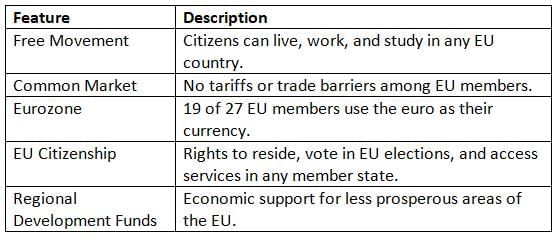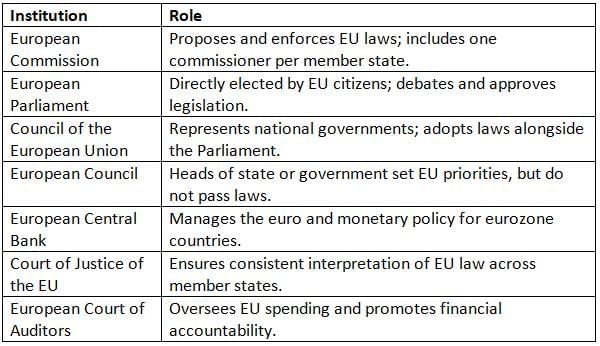The European Union Chapter Notes | AP European History - Grade 9 PDF Download
Introduction
In the aftermath of two catastrophic world wars, European nations pursued economic cooperation and political unity to prevent future conflicts. The vision of interdependence birthed the European Union (EU), a transformative alliance fostering peace, prosperity, and a shared identity. This chapter notes traces the EU’s evolution from early trade agreements to a powerful political entity, exploring its benefits, institutions, and challenges like economic crises and nationalist pushback.
From Coal and Steel to Continental Unity
Early Integration Efforts
- The roots of the European Union trace back to the European Coal and Steel Community (ECSC), founded in 1952. This agreement among six nations—France, West Germany, Italy, Belgium, the Netherlands, and Luxembourg—regulated industrial production, particularly war-related materials, to promote mutual economic growth and prevent future conflicts.
- In 1957, the Treaty of Rome established the European Economic Community (EEC), or Common Market, aimed at reducing trade barriers and harmonizing economic policies.
- In 1993, the Maastricht Treaty formally created the European Union, broadening cooperation into areas like foreign policy, security, and justice.
Key Idea: The EU transformed from a trade-focused alliance into a robust political and economic union, fostering a shared European identity and collaboration.
Benefits of Integration
EU member states adhere to shared principles and gain numerous advantages:
- Freedom of movement for people, goods, services, and capital across borders.
- Unified tariffs for trade with non-EU countries.
- EU citizenship, enabling residents to live and work in any member state.
- Access to development funds for less affluent regions.
- A single currency, the euro, adopted by many, though not all, member states.

Major Institutions of the European Union
The EU’s political framework is intricate, balancing collective authority with national sovereignty. While certain policies are set at the EU level, others remain under member state control.
Challenges to European Unity
The Euro Crisis (2009–2015)
The global financial crisis revealed weaknesses in the eurozone. Nations like Greece, Portugal, and Spain faced escalating debt and unemployment, unable to use tools like currency devaluation due to the shared euro.
- The European Central Bank (ECB) and International Monetary Fund (IMF) provided financial bailouts.
- Austerity measures triggered protests and political unrest.
- The crisis raised doubts about the viability of a unified currency.
Eurozone: A monetary union of 19 EU countries using the euro, where a shared currency restricts individual fiscal policy control.
Refugee Crisis (2015–Present)
Conflicts in Syria, Afghanistan, and North Africa led to a massive influx of refugees, challenging the EU’s unified response:
- Greece and Italy, as primary entry points, were overwhelmed by arrivals.
- Some countries, like Germany, welcomed many refugees, while others, such as Hungary and Poland, restricted entry.
- The crisis highlighted divisions in EU migration policies and cultural identities.
Democratic Backsliding
Concerns arose over the erosion of democratic principles in countries like Hungary and Poland:
- Weakening of judicial independence and press freedom.
- Rise of authoritarian populist movements.
- The EU activated Article 7 procedures to address breaches of democratic values.
Euroskepticism and Brexit
Increasing numbers of citizens and leaders questioned the EU’s authority:
- Euroskeptic parties, such as Reform UK, gained popularity across Europe.
- Criticisms centered on:
- Loss of national autonomy.
- Excessive regulation.
- Cultural standardization.
- In 2016, the United Kingdom voted to exit the EU, a process called Brexit, completed in 2020.
Euroskepticism: The view that EU integration undermines national sovereignty or democratic accountability.
Balancing Sovereignty and Integration
As the EU expanded its influence over economic and political matters, member states navigated the tension between national interests and EU commitments.
- Nations relinquish control over trade and monetary policies.
- Disputes emerge over immigration, environmental regulations, and judicial independence.
- Despite challenges, most European countries view continued cooperation as vital for peace, stability, and economic prosperity.
Conclusion
The European Union reshaped Europe from a region of rival states into a global economic powerhouse with a shared identity. Despite facing hurdles like economic crises and nationalist movements, the EU remains a cornerstone of European unity, influencing the continent’s future.
Key Terms
- Article 7 Procedure: A legal mechanism in the EU Treaty allowing action against member states violating core values like democracy and human rights, potentially leading to sanctions.
- Brexit: The United Kingdom’s withdrawal from the EU following a 2016 referendum, finalized in 2020, impacting trade, migration, and European integration.
- Common Market: A trade bloc enabling free movement of goods, services, capital, and labor, foundational to the EU’s economic integration post-World War II.
- Council of Ministers: An EU body of national ministers shaping legislation and coordinating policies, balancing member state interests in the legislative process.
- Court of Justice of the European Union: The CJEU ensures uniform application of EU law, resolving disputes and upholding treaties across member states.
- Democratic Backsliding: The erosion of democratic institutions, such as judicial independence and media freedom, raising concerns about governance within the EU.
- European Coal and Steel Community (ECSC): A 1951 organization creating a common market for coal and steel, fostering post-war economic cooperation and EU foundations.
- European Economic Community (EEC): Established in 1957, the EEC promoted economic integration through a common market, paving the way for the EU.
- European Food Safety Authority: An EU agency ensuring food safety through risk assessment and scientific advice, enhancing consumer protection since 2002.
- European Investment Bank: The EU’s lending arm, funding sustainable projects to support economic growth and regional development since 1958.
- Euro Crisis: A debt crisis affecting eurozone countries, driven by the 2007–2008 financial crisis, exposing economic disparities and prompting EU interventions.
- European Ombudsman: An independent body investigating maladministration in EU institutions, promoting transparency and accountability since 1995.
- European Data Protection Supervisor: An authority ensuring EU institutions comply with data protection laws, safeguarding privacy in a digital era.
- European Environment Agency: An EU agency providing environmental data to support sustainable policies and decision-making since 1993.
- European Union: A union of 27 European nations promoting peace, stability, and economic cooperation, significantly shaping global economics and politics.
- Euroskepticism: Criticism of EU integration, citing concerns over national sovereignty, regulation, and cultural identity, influencing events like Brexit.
- Law and Justice Party: A Polish conservative party advocating nationalist policies, sparking EU debates over democratic norms and governance.
- Member States of the EU: Countries within the EU sharing policies and benefiting from cooperation, contributing to economic and political unity.
- Refugee Crisis: A large-scale influx of refugees, particularly from 2015, challenging EU migration policies and exposing divisions among member states.
- The European Central Bank: The ECB manages the euro and monetary policy for the eurozone, ensuring price stability since 1998.
- The European Court of Auditors: An EU institution overseeing financial management, ensuring efficient and transparent use of funds.
- The European Parliament: A directly elected EU body shaping legislation, overseeing budgets, and ensuring accountability within the Union.
- The European Commission: The EU’s executive branch proposing laws, implementing decisions, and ensuring treaty compliance across member states.
- The European Council: Comprising heads of state or government, it sets the EU’s political priorities, addressing major economic and foreign policy issues.
- Viktor Orbán: Hungary’s Prime Minister since 2010, whose nationalist policies have raised EU concerns about democratic backsliding and rule of law.
FAQs on The European Union Chapter Notes - AP European History - Grade 9
| 1. What are the historical origins of the European Union? |  |
| 2. What are the major benefits of European integration? |  |
| 3. What are the key institutions of the European Union? |  |
| 4. What challenges does the European Union face in maintaining unity? |  |
| 5. How does the European Union balance national sovereignty with integration? |  |















